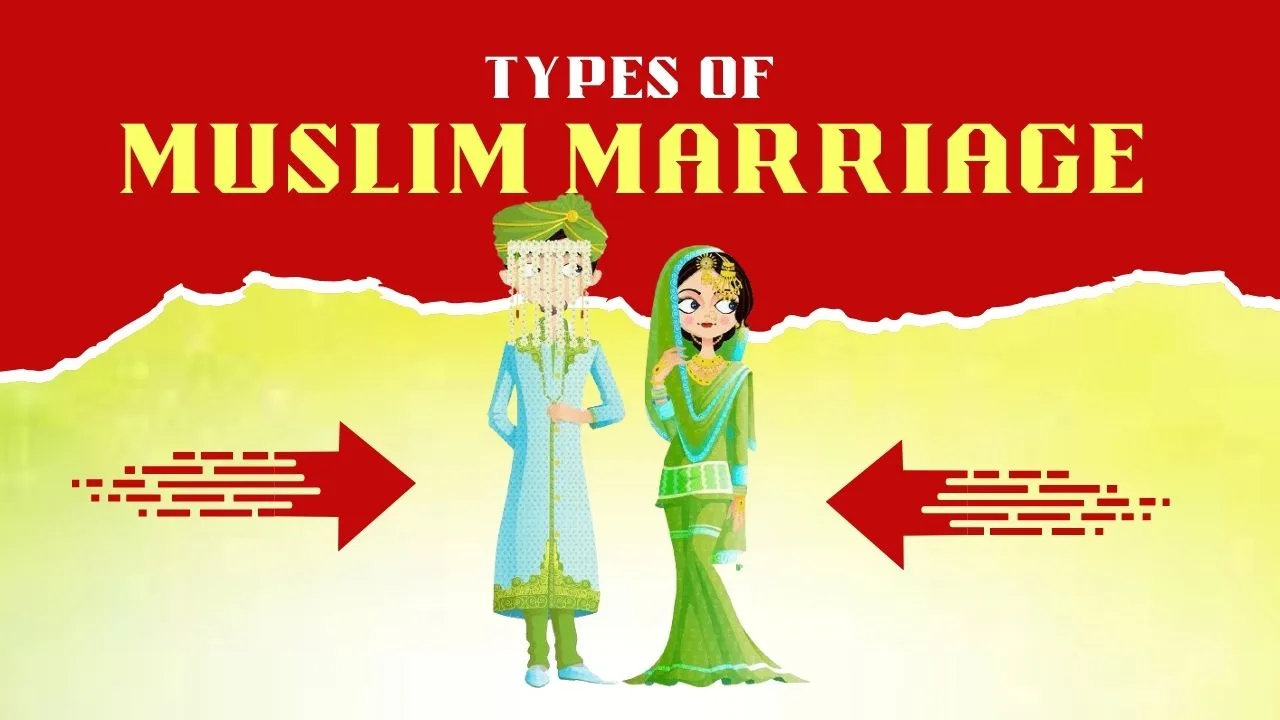Types of Muslim Marriage PDF: Different Muslim sects have their interpretations of marriage laws. For instance, Sunni law requires witnesses for a marriage to be valid, whereas Shia law does not.
Muslim marriages generally fall into four categories: Sahih, Batil, Fasid, and Muta.
A marriage is considered valid if it meets the specific conditions and ceremonies prescribed by the relevant Muslim sect. A void marriage, or Batil marriage, is deemed null and void due to certain legal impediments.
An irregular marriage, or Fasid marriage, is temporarily invalid but can become valid once the irregularities are removed. Muta marriage is a temporary marriage recognized under Islamic law, with a predetermined duration.
Read Also: Schools of Muslim Law in India- Notes PDF
Types of Muslim Marriages:
Sahih (Valid) Marriage: Sahih marriage, also known as Nikah The most common and lawful form, based on mutual consent and adherence to Islamic principles.
Batil (Void) Marriage: Considered null and void due to legal impediments, such as consanguinity or affinity.
Fasid (Irregular) Marriage: Temporarily invalid but may become valid once irregularities are corrected.
Muta (Temporary) Marriage: A fixed-term marriage contract, recognized primarily in Shia Islam, automatically dissolves at the end of the specified period.

Sahih (Valid) Marriage Characteristics:
- Sahih marriage, also known as Nikah
- Permanent and stable union, intended to last for life.
- Based on mutual consent and agreement.
- Must follow Islamic principles, including the presence of witnesses, payment of dower (mahr), and recitation of specific formulae.
· Legal Requirements for Sahih Marriage:
- Proposal and acceptance must occur in the same meeting.
- Presence of witnesses (required in Sunni law but not in Shia law).
- Parties must be of sound mind, at puberty, and free to consent.
- No legal disabilities should exist (e.g., consanguinity, polygamy).
· Consequences of Sahih Marriage:
- Valid marriage creates mutual duties and obligations.
- Sexual relations are lawful; children are legitimate.
- Parties can inherit from each other; the wife is entitled to dower.
Batil (Void) Marriage:
- Lacks necessary conditions for validity.
- No legal rights or obligations arise; children are illegitimate.
- Examples include marriages between close blood relatives or with someone else’s wife.
Fasid (Irregular) Marriage:
- Invalid due to unfulfilled conditions but can be corrected.
- Recognized only under Sunni law.
- Examples include marriage without witnesses or marriage with a fifth wife.
Muta (Temporary) Marriage:
- A fixed-term marriage contract, is primarily recognized in Shia Islam, although it is not recognised by Sunni Muslims.
- Automatically ends when the contract expires.
- Provides a temporary marital relationship without violating Islamic law.
Legal Requirements for a Valid Muta Marriage
Legal Requirements:
- Consent: Parties must have the capacity to consent; must be of sound mind, free from coercion, and have reached puberty.
- Offer and Acceptance: Marriage contract involves an offer (by the man) and acceptance (by the woman).
- Mahr: Mandatory payment of a fixed amount or property (dowry) by the man to the woman.
- Witnesses: Must be witnessed by two male witnesses or one male and two female witnesses, all of sound mind and of Muslim faith.
Characteristics:
- Fixed-term contract: Marriage is for a specified period.
- No automatic inheritance: Parties do not automatically inherit from each other.
- No automatic child custody: The mother does not automatically gain custody of children born from the marriage.
Criticisms and Controversies:
- Morality: Criticized for violating Islamic concepts of morality.
- Exploitation: Viewed as potential exploitation of vulnerable women, especially those needing financial support.
- Legal status: Not recognized by the Indian legal system, leading to lack of legal protection for women in such marriages.
Conclusion
Islamic law recognizes four distinct types of Muslim marriage, each with its own unique characteristics and legal requirements. These marriages are governed by different rules and regulations. Although some forms of these marriages have faced controversy and criticism, they remain practiced in various regions of the Muslim world.
Download PDF File
Wait Time remaining: 50 seconds
FAQs-
How many types of Muslim Marriage are?
Muslim marriages generally fall into four categories: Sahih, Batil, Fasid, and Muta. An irregular marriage, or Fasid marriage, is temporarily invalid but can become valid once the irregularities are removed. Muta marriage is a temporary marriage recognized under Islamic law, with a predetermined duration.
What is Sahih (valid) marriage ?
Sahih marriage, also known as Nikah, is most common and lawful form, based on mutual consent and adherence to Islamic principles. The marriage is based on mutual consent and the parties are free to negotiate and agree upon the terms and conditions of the marriage.
What is Muta Marriage in Muslims?
Muta marriage is a temporary marriage contract that is prevalent in Shia Islam, although it is not recognised by Sunni Muslims. Automatically ends when the contract expires.


